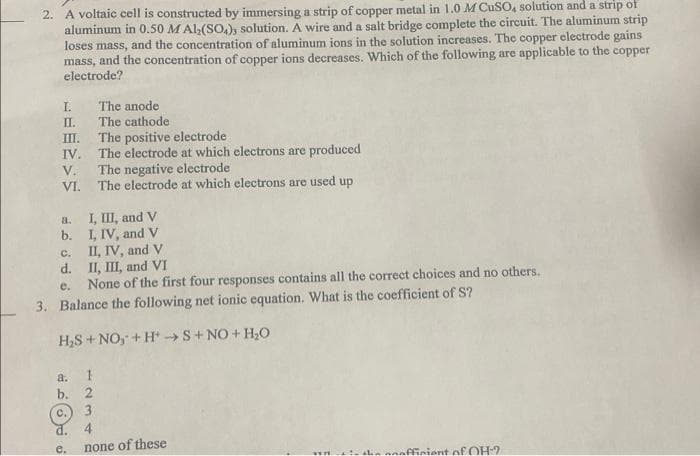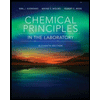2. A voltaic cell is constructed by immersing a strip of copper metal in 1.0 M CuSO, solution and a strip of aluminum in 0.50 M Al-(SO.), solution. A wire and a salt bridge complete the circuit. The aluminum strip loses mass, and the concentration of aluminum ions in the solution increases. The copper electrode gains mass, and the concentration of copper ions decreases. Which of the following are applicable to the copper electrode? L. I. The anode The cathode III. The positive electrode The electrode at which electrons are produced The negative electrode VI. IV. V. The electrode at which electrons are used up I, II, and V b. I, IV, and V II, IV, and V d. a. C. II, III, and VI None of the first four responses contains all the correct choices and no others. e. fiaiant of S?
2. A voltaic cell is constructed by immersing a strip of copper metal in 1.0 M CuSO, solution and a strip of aluminum in 0.50 M Al-(SO.), solution. A wire and a salt bridge complete the circuit. The aluminum strip loses mass, and the concentration of aluminum ions in the solution increases. The copper electrode gains mass, and the concentration of copper ions decreases. Which of the following are applicable to the copper electrode? L. I. The anode The cathode III. The positive electrode The electrode at which electrons are produced The negative electrode VI. IV. V. The electrode at which electrons are used up I, II, and V b. I, IV, and V II, IV, and V d. a. C. II, III, and VI None of the first four responses contains all the correct choices and no others. e. fiaiant of S?
Principles of Modern Chemistry
8th Edition
ISBN:9781305079113
Author:David W. Oxtoby, H. Pat Gillis, Laurie J. Butler
Publisher:David W. Oxtoby, H. Pat Gillis, Laurie J. Butler
Chapter17: Electrochemistry
Section: Chapter Questions
Problem 16P
Related questions
Question

Transcribed Image Text:2. A voltaic cell is constructed by immersing a strip of copper metal in 1.0 M CuSO, solution and a strip of
aluminum in 0.50 M Al;(SO,), solution. A wire and a salt bridge complete the circuit. The aluminum strip
loses mass, and the concentration of aluminum ions in the solution increases. The copper electrode gains
mass, and the concentration of copper ions decreases. Which of the following are applicable to the copper
electrode?
I.
The anode
П.
The cathode
The positive electrode
The electrode at which electrons are produced
V.
III.
IV.
The negative electrode
VI.
The electrode at which electrons are used up
a. I, III, and V
b. I, IV, and v
II, IV, and V
d. II, II, and VI
None of the first four responses contains all the correct choices and no others.
C.
e.
3. Balance the following net ionic equation. What is the coefficient of S?
H,S+NO, + H S+NO+ H,O
a.
b. 2
с.) 3
4
d.
e.
none of these
ffinient of OH-2
Expert Solution
This question has been solved!
Explore an expertly crafted, step-by-step solution for a thorough understanding of key concepts.
This is a popular solution!
Trending now
This is a popular solution!
Step by step
Solved in 2 steps

Knowledge Booster
Learn more about
Need a deep-dive on the concept behind this application? Look no further. Learn more about this topic, chemistry and related others by exploring similar questions and additional content below.Recommended textbooks for you

Principles of Modern Chemistry
Chemistry
ISBN:
9781305079113
Author:
David W. Oxtoby, H. Pat Gillis, Laurie J. Butler
Publisher:
Cengage Learning

Chemistry: Principles and Reactions
Chemistry
ISBN:
9781305079373
Author:
William L. Masterton, Cecile N. Hurley
Publisher:
Cengage Learning


Principles of Modern Chemistry
Chemistry
ISBN:
9781305079113
Author:
David W. Oxtoby, H. Pat Gillis, Laurie J. Butler
Publisher:
Cengage Learning

Chemistry: Principles and Reactions
Chemistry
ISBN:
9781305079373
Author:
William L. Masterton, Cecile N. Hurley
Publisher:
Cengage Learning


Chemical Principles in the Laboratory
Chemistry
ISBN:
9781305264434
Author:
Emil Slowinski, Wayne C. Wolsey, Robert Rossi
Publisher:
Brooks Cole

Chemistry: Principles and Practice
Chemistry
ISBN:
9780534420123
Author:
Daniel L. Reger, Scott R. Goode, David W. Ball, Edward Mercer
Publisher:
Cengage Learning

Physical Chemistry
Chemistry
ISBN:
9781133958437
Author:
Ball, David W. (david Warren), BAER, Tomas
Publisher:
Wadsworth Cengage Learning,